 |
Worm in the Apple German Traitors and Other Influences That Pushed the World Into War: The little-known story of the men who destroyed Adolf Hitler's Germany Friedrich Lenz 12. The assassination attempt of July 20, 1944: a shot in their own - and in Germany's foot Even though just before his death the Red General Kurt Hammerstein had "passionately implored" Herrn von Hassel: "Just don't bungle it, like Kapp did! Tell Herrn Goerdeler!", the actual attempt of July 20, 1944 was so pathetically organized that one can only shake one's head in amazement. Just imagine: Germany is engaged in a war against opponents with several times as many soldiers, and some lunatics come along and say: "We'll blow the Head of State away, order some divisions to march to Berlin, and then everything will be okay. We don't need to worry about what will happen if the Head of State isn't dead and the divisions don't march, since he's simply got to be dead, because that's the way we want it." But since he wasn't dead, they at least "lied him dead" for a couple of hours, once again ignoring the simple facts, in this case that it would not take long for this lie to be uncovered as such. And this was the clique that wanted to replace an Adolf Hitler who, to use their own words, was a genius "at least in his diabolical cleverness"! The fact that he made the wrong decisions on September 1, 1939 and the day before Dunkirk was not due to political myopia, but rather to the insurmountable compulsion of crystal-clear far-sightedness arising from the essence of the German nature; in the absence of sufficient democratic freedoms I cannot go into detail at this point, but time will prove my assertion to be correct. I will quote two statements of the conspirators themselves as evidence for the amateurish organization of the putsch: In his remarks on July 20, 1944, Emil Henk writes: "The plot hinged on a most decisive prerequisite: Hitler's death. It failed to consider adequately that the assassination attempt might fail. It ought to have had precisely choreographed plans for a revolt even in the event that Hitler lived. "It considered only the assassination. It considered military actions after Hitler's death, but it did not take into account the civil war it could not help but unleash if the despot was only badly injured. The fateful day ought to have been approached with both alternatives open: assassination or civil war. The decision was simple: only civil war could save Germany, and them if need be. "In other words: the putsch was based on an exclusively military foundation. The mass uprising that was to follow the military action never happened. The torch that was to call the political elite to battle, to a general strike, to armed force - that torch failed to ignite. "One thing is clear: revolutions are initiated by elites. Regardless, which. Their task is to bring about the initial situation that will change everything, and to guide the advance of the masses towards the successful coup. "Neither had been sufficiently prepared for, and the decisive mental clarity indispensable for both was also lacking. And something else was lacking: tactical ability. The officers did not dare to bring about the civil war. It was almost pure chance that Stauffenberg could even risk the assassination attempt. It took awesome courage and utter cold-bloodedness. But everything hinged on one man! If he failed, a coup of utmost significance to the course of world history also failed. What a historical paradox!" H. B. Gisevius put it more succinctly: "The morning after July 20 - was the beginning of the tragedy of July 20. For it is not the abortive assassination, not the failed coup that can be considered as tragic; there was too much incompetence, too much carelessness, too much indecision, too much unquestioning faith in blind obedience at work, to dignify this failure as a tragedy. Nothing was taken to its conclusion that day. Everything went only half-way. These officers see it all coming - the military defeat, even their own catastrophe, everything. They realize that things cannot go on like 'this'. After much hesitation they finally decide to act. They make the attempt. But then some of them don't go the distance, and others take a breather right in the final stretch. Still others turn back from the very edge of the diving board, and the rest proceed to prove beyond a shadow of a doubt that to attempt the dive would have been foolhardy anyhow." Henry Bernhard, Stresemann's Secretary, an uninvolved but sympathetic expert, in Finis Germaniae: "It is certain that the entire operation of July 20, 1944 was begun with downright unique awkwardness. And if it is true that almost two whole years lie between the plan's inception and its execution, then that only shows all the more the lack of maturity and circumspection.... The many conversations which I have had with friends, acquaintances and journalists... confirm the impression that at least some of these men were political dilettantes, and of the type that is anything but born or suited to the role of 'conspirator'." As for the moral aspect, I shall quote an unknown source: "It already began when Stauffenberg was the only one of all the conspirators to be willing to carry out the actual assassination. One must consider first of all that, to the conspirators' minds, the fate of a nation of 80 million souls depended on this assassination. Now consider that thousands of German soldiers, fully aware of their danger, nevertheless did not hesitate to risk their lives as fighter divers to sink an enemy shop, as single combatants to take out a tank, or as fighter pilots to eliminate a strategically significant target, and that millions gave their lives on all battle fronts in the defense of a house, a trench, a battery position, etc. Then contrast this with the spirit of these collaborators of July 20, whose alleged stake was the fate of a nation; and for this grand goal, only one - Stauffenberg - was willing to attempt the assassination." A friend of Colonel Stauffenberg's who was gravely injured in the attempt wrote: "Stauffenberg had often reported to Hitler privately. Why did he not take one of those occasions to simply shoot him down, why did he plant a bomb instead, then leave, and blow me and his other unsuspecting friends sky-high right along with Hitler?" The devastating effects of the conspirators' activities on the military situation itself - effects which are so hotly disputed - are a story all to themselves. Historiography has yet to reveal its findings in this respect, but one may already safely say that, aside from the enemy's numerical supremacy and the National-Socialist leadership's own mistakes - which, however, occurred not so much in military as in economic and other respects - the conspirators' treasonous activities had a decisive part in Germany's defeat; in particular:
In his book Invasion 44, General Speidel, Chief of General Staff of Army Group B (Rommel), describes the concerns of the military leaders prior to the invasion: "...In a country seat in Mareil-Marly near St. Germain, on May 15, 1944, following initial discussion of the Chief of General Staff of Army Group B, detailed talks were held in the presence of both Chiefs of General Staff between Rommel and Stülpnagel about the measures necessary to end the war in the west. Following an overview of the political and military events, and in favor of the overthrow of the National-Socialist regime, the theoretical and practical preparations were set out in detail. Both military commanders also repeatedly urged their political and military concerns on the Commander-in-Chief West, von Rundstedt, who was not indisposed to listen. In May, the General Quartermaster of the Army, Artillery General Eduard Wagner [one of those responsible for the lack of winter equipment and outfitting at the Eastern Front in 1941-42], came to the Army Group's command post in order to co-ordinate the necessary measures in the West with the preparations of the Army Supreme Command. He informed Rommel of the active forces of Resistance in the Army Supreme Command, of the timetable-like preparations for a revolt, and (for the first time) of the earlier assassination attempts against Hitler. The Field Marshal opposed the plans for an assassination, for the reason that he did not want to see Hitler made a martyr.... "Further, discussions focused on the possibilities of negotiations with the Western Allies: via the Vatican, via the British Ambassador in Madrid, Sir Samuel Hoare, and via Swiss connections. The opponents had already been cautiously approached via Rome, Madrid and Lisbon, but this had not yielded any results as yet.... "In the second round of talks, connections were strengthened between the camps of the Resistance, and a line of communications to Rommel's command post was established, which stood the test and remained undiscovered....
"...In these portentous evening hours the battle fronts at Caen and St. Lo were in a crisis of defence. The Commander-in-Chief and Chief telephoned, requested reserves and demanded details of the events at Hitler's headquarters and in Berlin, which they had heard about on the radio. The Army Group's Chief of General Staff was the one to answer this question, and to singlehandedly make the decision necessary for maintaining the battle front! "...For political reasons as well, the Field Marshal deemed it advisable to have reliable tank units on hand for any situation that might potentially arise." According to his book Germany's Underground, Dulles was able, on the basis of information given him by the plotters, to radio to Washington as early as April 1944 that German Generals in command at the Western Front were prepared to cease resistance and even to facilitate the landing of Allied troops. Preparations were even under way, he said, to receive Allied paratroops at key locations in Germany. In early May 1944 he received a plan which Gisevius had brought from Berlin, according to which the Generals were willing to clear the way for American and British troops. In this same respect, the periodical Nation Europa reported: "500,000 soldiers were at Rommel's disposal for defence purposes. At the same time, however, the Commander-in-Chief of the Reserves held back 600,000 men fit for active service in the barracks at home, so as to ensure the success of the coup. "In the battle at the central Russian front the troops had no armor-piercing weapons to use in defense against advancing Soviet tanks. The saboteurs had diverted the whole of such armor-piercing weapons to - Greece, where there were partisans, but no tanks! "At the start of the invasion, despite the urgent red alert and a strict ban on leave, the Commander-in-Chief in charge was not present at the battle front, where the force of his personality might have turned the tide of fate, but rather in Herrlingen near Ulm."
And finally, a clever radio broadcast was used to betray to the Americans that Germany had cracked the Cairo Code. The consequences of this were a crucial disadvantage to Rommel's front in Africa.
"If Stalin does not retrospectively award him the most precious medal he has to give, then he is
truly a skinflint, for: when the German armies advanced in western Russia, and when major
Russian units were wiped out, the matter of Siberian reinforcements became vital. But the Red
Army could not dare expose its Siberian flank as long as the Japanese were poised to strike.
Sorge
was able to assure them that the Japanese would not attack. Thus, the Siberian troops could be
safely withdrawn to the West, and arrived in time to successfully defend Moscow.
v. Tresckow feigned utter exhaustion to gain several months' leave in Berlin, during which time he availed himself of his sister's apartment to draw up the complete set of fake plans for an alleged 'Valkyrie' manoeuver intended to camouflage the coup of July 20. It is said that he shot himself on July 21, 1944, but this claim is open to question. In his book Chief of Intelligence, the Englishman Jan Colvin reports that important details of the plans for 'Operation Sea Lion' (the landing in England) were betrayed to Churchill right off the drawing board. He gives us to understand that Canaris might be the culprit in this case. Since v. Tresckow had very close relations with Canaris and Oster and was employed in a key position of the special staff for the development of these plans, one can assume that he was involved in this betrayal. Malte Plettenberg, the author of the very objective but nevertheless deeply impressive book Guderian: Hintergründe des deutschen Schicksals 1918 bis 1945, writes: "Historical research must as yet deal in greater detail with the reasons for the collapse of Army Group Central, whose Chief of Staff, Tresckow, was the heart and soul of the military conspiracy. The degree of this catastrophe is far greater than the tragedy of Stalingrad: the troops of an entire Army Group and the supplies for two Army Groups simply disappeared. It will not be possible to compensate for this loss."
On June 22, 1944, the battle front still extended from Rogatschew via Orscha to Witebsk and
was
already in East Prussia on July 3. No wonder that Hitler exclaimed, "How is it possible to lose a
front such as that! This entire development is a mystery to me."
27The women of the Rote
Kapelle who participated in these treasonous activities were even commended in the July
20,
1952 special edition of the government publication Das Parlament. ...back... |






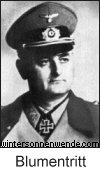 was made to kill Hitler in his
was made to kill Hitler in his 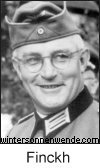 "On the orders of the General Quartermaster, Artillery General Wagner, the new General
Quartermaster in the West, General Staff Colonel Finckh, reported to the Army Group's
command
post and described the preparations for the elimination of Hitler and the planned coup to save the
nation. He reported on the failure of earlier assassination attempts and on the preparations for a
new attempt to be carried out in Berchtesgaden. Rommel again expressed his view that for the
reasons given previously he considered Hitler's physical elimination by means of an
assassination
to be inexpedient, and advocated his arrest and sentencing by a German court instead. He
commissioned Colonel Finckh to work with the General Quartermaster in preparing the
necessary initial co-ordination of all steps taken at Headquarters and in Germany, and to report
to
him as soon as possible. In his opinion, this crucial matter was being considered in far too many
different places at once....
"On the orders of the General Quartermaster, Artillery General Wagner, the new General
Quartermaster in the West, General Staff Colonel Finckh, reported to the Army Group's
command
post and described the preparations for the elimination of Hitler and the planned coup to save the
nation. He reported on the failure of earlier assassination attempts and on the preparations for a
new attempt to be carried out in Berchtesgaden. Rommel again expressed his view that for the
reasons given previously he considered Hitler's physical elimination by means of an
assassination
to be inexpedient, and advocated his arrest and sentencing by a German court instead. He
commissioned Colonel Finckh to work with the General Quartermaster in preparing the
necessary initial co-ordination of all steps taken at Headquarters and in Germany, and to report
to
him as soon as possible. In his opinion, this crucial matter was being considered in far too many
different places at once....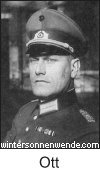 First and foremost he was a dedicated Communist working in the
service of the Soviet Union, but as it has turned out, his activities were made much easier for
him
by the friendship and incredible thoughtlessness of Ambassador Ott in Tokyo. Now if one
considers that Ott used to be
Schleicher's right-hand man, this may explain a great deal. In its issue of June 13, 1951 the
German news magazine Der Spiegel wrote the following about Sorge:
First and foremost he was a dedicated Communist working in the
service of the Soviet Union, but as it has turned out, his activities were made much easier for
him
by the friendship and incredible thoughtlessness of Ambassador Ott in Tokyo. Now if one
considers that Ott used to be
Schleicher's right-hand man, this may explain a great deal. In its issue of June 13, 1951 the
German news magazine Der Spiegel wrote the following about Sorge: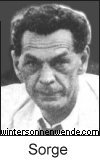 After the battles of
encirclement at Minsk and Orel the Russians were extremely worried that the Japanese might
annul the non-aggression pact they had only just entered into, and strike at the Siberian flank of
the hard-pressed Red Army. In August 1941 Sorge reported that the Japanese fleet had enough
oil
to last them two years, but the armies had only enough to last them for six months. Among the
countless political, economic and military details that Sorge passed on to
Russian Counter-Intelligence there was also the report of May 20, 1941 which divulged that
between 170 and 190 divisions stood at the ready to attack Moscow in a major offensive thrust
on
June 20."
After the battles of
encirclement at Minsk and Orel the Russians were extremely worried that the Japanese might
annul the non-aggression pact they had only just entered into, and strike at the Siberian flank of
the hard-pressed Red Army. In August 1941 Sorge reported that the Japanese fleet had enough
oil
to last them two years, but the armies had only enough to last them for six months. Among the
countless political, economic and military details that Sorge passed on to
Russian Counter-Intelligence there was also the report of May 20, 1941 which divulged that
between 170 and 190 divisions stood at the ready to attack Moscow in a major offensive thrust
on
June 20."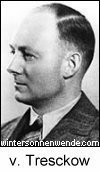 7. Major General H. v. Tresckow was one of the leading
figures in the conspiracy against Hitler. He was the Chief of General Staff to Army Group
Central.
At first he tried to win not only all the officers around him but also especially the various
Commanders-in-Chief of the Army Group as participants in the conspiracy. Several times he
attempted to lure Hitler to the group's headquarters for discussions. When he had succeeded in
this, he gave an unsuspecting escort of Hitler's a parcel to take along, which
contained a high-explosive bomb that was supposed to detonate on the airplane. The plane,
however, arrived safely
at headquarters, as the bomb failed to go off. Several other attempts also followed.
7. Major General H. v. Tresckow was one of the leading
figures in the conspiracy against Hitler. He was the Chief of General Staff to Army Group
Central.
At first he tried to win not only all the officers around him but also especially the various
Commanders-in-Chief of the Army Group as participants in the conspiracy. Several times he
attempted to lure Hitler to the group's headquarters for discussions. When he had succeeded in
this, he gave an unsuspecting escort of Hitler's a parcel to take along, which
contained a high-explosive bomb that was supposed to detonate on the airplane. The plane,
however, arrived safely
at headquarters, as the bomb failed to go off. Several other attempts also followed.

